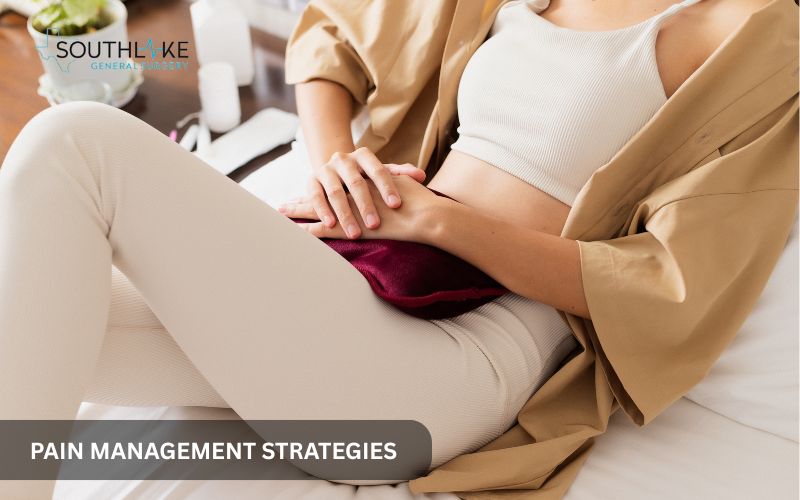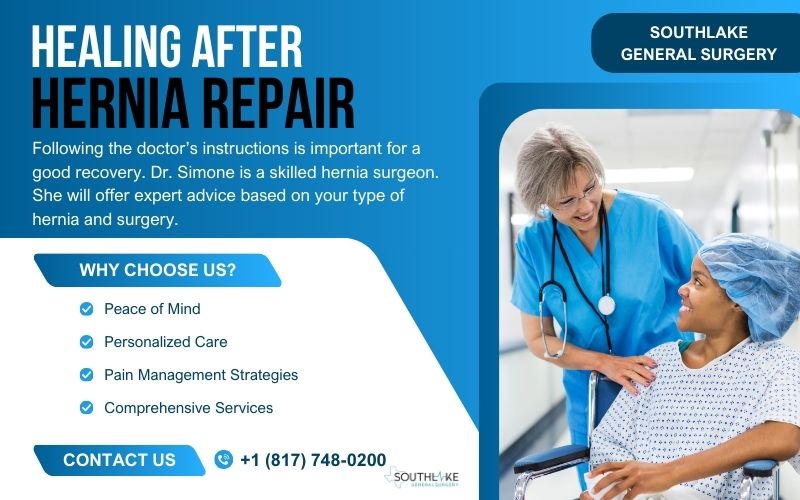Healing after hernia repair needs patience and care. The journey of healing varies for each individual and requires patience. If you follow your healthcare provider’s advice closely, you can help your body heal and recover more quickly.
Every step matters. This includes taking care of yourself after surgery and slowly going back to your daily activities. Always listen to your body and take your time during this healing process.
Key Highlights
- Recovery time after hernia surgery is not the same for everyone.
- Many people can leave the hospital on the same day and go back to work in a few days or up to two weeks.
- You should feel better in a few days and see progress by the end of the week.
- It is important to avoid strenuous activities, like heavy lifting, for at least four weeks.
- You can start walking and do some light exercise sooner if you feel ready.
Immediate Post-Surgery Care

After your surgery, your doctors will give you important instructions. It’s really important to follow these rules carefully. They will help you heal and lower the risk of complications. You will probably go home on the same day as your hernia surgery. Be sure to have someone ready to drive you and help you during the first 24 hours.
In the beginning, you should rest and let your body heal. You can also try some light activities, such as walking, when you can. This will help stop blood clots and improve blood flow. It can help you heal faster and reduce the risk of constipation.
Importance of Rest and Activity Limitations
After your hernia repair, you need to rest and also move around. A lot of rest is good for healing your surgical site. You should avoid strenuous activities that can stress your abdominal muscles. By doing this, you will recover faster.
Rest is important. It is also good to add light activities to your day. Walking, for example, helps blood flow, stops constipation, and keeps your muscles healthy. Start with short walks around your home. As you feel better, you can walk longer distances.
Always pay attention to your body. If you feel pain or discomfort, stop what you are doing and take a break. It’s better to take it slow than to push yourself too hard. Doing this can help you feel better faster.
Pain Management Strategies for Hernia Repair Recovery Time

After hernia surgery, pain can feel different for each person. It can also change based on what the doctor did during the surgery. Your medical team will probably give you pain medication to help with any discomfort as you heal. It is important to take these medications as your doctor says, even if your pain feels mild.
You can take common pain relievers like acetaminophen or ibuprofen for mild to moderate pain. Your doctor may also give you medication for pain relief. Always remember that you should speak with your doctor first. They can tell you if these medicines are safe for you. Your health history, allergies, and other medicines you take can affect their safety.
You can feel better by doing simple things along with your medicine. Using ice packs on the affected area can help with pain and swelling. When you are resting, try to lift the surgical area to reduce swelling. Always talk to your medical team for advice that fits your needs.
Signs to Monitor for Complications Post Hernia Repair
Hernia repair is a safe surgery most of the time. Still, it’s important to watch for any problems. If you get a fever over 101 degrees Fahrenheit, feel cold chills, or have severe pain that does not improve with pain medication, call your doctor right away. You should also act fast if you notice redness, swelling, or any discharge at the incision site. Stay alert for these signs of complications:
- If you notice swelling, redness, warmth, and feel pain in your leg, it could mean you have a blood clot or deep vein thrombosis (DVT).
- If you feel short of breath or have chest pain, it might mean you have a pulmonary embolism. This can happen if a blood clot moves to your lungs.
It’s important to spot and deal with problems early. This can make you feel better and reduce the chance of long-term health issues. By being aware and taking action, you can look after your health after surgery.
Short-Term Recovery Guidelines
After your hernia repair, your body needs time to heal. Some tips can help you feel better and recover faster. These tips usually involve changing your daily activities, diet, and lifestyle.
Listen closely to your doctor’s instructions about how to take care of your wound. Pay attention to the medications you should use and the activities you should stay away from. If you follow these steps, it will help your body heal. This will make you feel better and lower the chance of problems.
Gradual Increase in Physical Activities for Recovery After Hernia Repair

As your cut gets better and the pain goes down, you can do more activities. It’s good to start slow and then make your exercises a bit harder or longer. Begin with quick walks and easy jobs at home. Don’t lift heavy things or do tough movements that might hurt your stomach muscles.
About two weeks after your surgery, you can start driving again. You can also do some light exercises. This includes activities like cycling, swimming, or using an elliptical machine. Pay attention to your body. If you experience any pain or discomfort, please pause and rest for a moment.
Before starting a new exercise plan, you should talk to your surgeon or a physical therapist. They are able to observe your healing progress. They will provide you with useful suggestions tailored to your needs. The type of surgery you underwent will be taken into account.
Dietary Recommendations for Healing After Hernia Repair

Eating well is key to your recovery after hernia surgery. Choosing nutritious foods helps your body heal and strengthens your immune system. Be sure to add plenty of fruits, vegetables, and whole grains to your meals. These foods offer important vitamins, minerals, and fiber.
It’s very important to drink enough fluids, especially water, for your recovery. Drinking lots of fluids can help you avoid dehydration. It helps with digestion, too, and can keep constipation from occurring. After surgery, if you take some pain medicines, you might experience constipation.
It’s a good idea to eat foods that have a lot of protein. Protein is key for your body. It helps to fix and grow tissues. Some good sources of protein are lean meats, poultry, fish, beans, lentils, and low-fat dairy products.
Importance of Follow-up Appointments
Seeing your healthcare team for follow-up appointments is very important for your recovery. These visits allow your surgeon to see how you are doing. They can answer your questions and make sure you are healing properly.
During these appointments, your doctor will examine your incision site. They will check your pain level. If necessary, they might adjust your medicine. This is a great time to talk about any issues you are facing, like trouble sleeping, constipation, or handling daily tasks.
It is important to talk openly with your healthcare team as you recover. If you stick to the doctor’s instructions, ask questions, and share your concerns, you will receive the care you need. This can help you feel better and return to your daily life.
Long-Term Recovery and Prevention
Congratulations! You are beginning your recovery journey. As you feel better, you will gain strength and energy. This time is about returning to your normal activities. It is also key to find ways to prevent hernias from returning.
If you want to feel healthier, start making better choices. Pay attention to living well and building good habits. This can reduce your chances of getting hernias in the future. You will feel happier and have more energy!
Resuming Normal Activities and Exercise
When your body feels ready, you can return to your regular activities. Just take it slow. Begin with easy tasks like cleaning, shopping, and seeing friends. As you feel better, you can try harder activities. Remember, avoid strenuous activities for six to eight weeks after surgery. This means no heavy lifting, tough exercises, or anything that might strain your stomach muscles. Always follow your doctor’s advice about this.
When you begin to exercise again, choose activities that feel good for your stomach. Swimming, cycling, and walking are great options since they are gentle. Listen to your body. If you experience any pain or discomfort, please stop immediately. As you feel better, slowly make your workouts harder and increase their intensity a bit.
It’s smart to be careful. Before you change your routine, talk to your doctor. They can give you advice that is right for your recovery and needs.
Strategies to Prevent Future Hernias
Hernia repair surgery usually gives good results. However, it’s crucial to follow healthy habits to reduce the risk of getting hernias again. A key point is to avoid heavy lifting. This is essential during your recovery and even after you feel better.
If your job involves manual labor or heavy lifting, consider having a conversation with your employer. You can talk about ways to lessen the stress on your stomach muscles.
Maintaining a healthy weight is important. Being a little overweight can put more stress on your stomach. This extra pressure may weaken the muscles in your stomach. To feel better, you can add exercise, eat a balanced diet, and have smaller portions in your daily routine.
If you smoke, it is a good idea to quit. Smoking can damage the tissues in your body, especially in the stomach. This raises the possibility of developing a hernia. Please speak with your doctor about stopping smoking. They can offer programs and useful tips to help you.
Conclusion
Recovery after hernia repair is very important for good results. You should follow your doctor’s instructions closely. Watch for signs of complications. Gradually increase your physical activities. A healthy diet is important too. Don’t forget to attend your follow-up appointments.
As you feel better, return to normal activities step by step. Take steps to stop future hernias from happening. If you feel severe pain or see signs of a blood clot, contact your healthcare team immediately. Don’t forget to rest, drink enough water, and stick to the guidelines to recover faster.
Make an Appointment
To feel better after having a hernia repair, you should visit Dr. Valeria Simone, MD, at Southlake General Surgery in Texas, USA. You can contact our healthcare expert today at +1 (817) 748-0200.
Following the doctor’s instructions is important for a good recovery. Dr. Simone is a skilled hernia surgeon. She will offer expert advice based on your type of hernia and surgery. This will help create a care plan that meets your needs. Trust the Hernia Center of Southlake General Surgery for full support during your healing process.
Frequently Asked Questions
How long should I rest after the surgery?
After hernia surgery, it is a good idea to rest for a couple of days. You can also do some light activities, like taking short walks, to aid in your recovery. Pay attention to your body. You should not push yourself too hard. Your overall health will help you figure out how much activity is right for you.
What indicators of infection should I be on the lookout for?
If you notice more redness, swelling, or warmth around the incision site, get in touch with your care team immediately. Also, keep an eye out for other signs like fever, severe pain, or fluid coming from the affected area. These symptoms need quick medical attention.
Medically Reviewed By: Dr. Valeria Simone MD
Board-certified General Surgeon at Southlake General Surgery, Texas, USA.
Follow us on Facebook and YouTube.
References:
- Website, N. (2025, March 7). Inguinal hernia repair. nhs.uk. https://www.nhs.uk/conditions/inguinal-hernia-repair/
- Andresen K, Rosenberg J. Management of chronic pain after hernia repair. J Pain Res. 2018 Apr 5;11:675-681. doi: 10.2147/JPR.S127820. PMID: 29670394; PMCID: PMC5896652.
- Assakran BS, Al-Harbi AM, Abdulrahman Albadrani H, Al-Dohaiman RS. Risk Factors for Postoperative Complications in Hernia Repair. Cureus. 2024 Jan 9;16(1):e51982. doi: 10.7759/cureus.51982. PMID: 38205086; PMCID: PMC10777094.
- Schaaf S, Willms A, Schwab R, Güsgen C. Recommendations on postoperative strain and physical labor after abdominal and hernia surgery: an expert survey of attendants of the 41st EHS Annual International Congress of the European Hernia Society. Hernia. 2022 Jun;26(3):727-734. doi: 10.1007/s10029-021-02377-w. Epub 2021 Feb 24. PMID: 33629178; PMCID: PMC9200870.
- Kim, H. O., Kang, M., Lee, S. R., Jung, K. U., Kim, H., & Chun, H. (2018). Patient-Controlled Nutrition After Abdominal Surgery: Novel Concept Contrary to Surgical Dogma. Annals of Coloproctology, 34(5), 253–258. https://doi.org/10.3393/ac.2018.05.29
- Hirsch KR, Wolfe RR, Ferrando AA. Pre- and Post-Surgical Nutrition for Preservation of Muscle Mass, Strength, and Functionality Following Orthopedic Surgery. Nutrients. 2021 May 15;13(5):1675. doi: 10.3390/nu13051675. PMID: 34063333; PMCID: PMC8156786.

